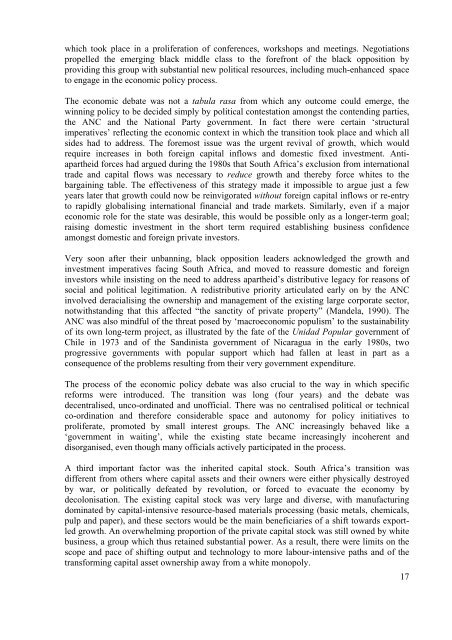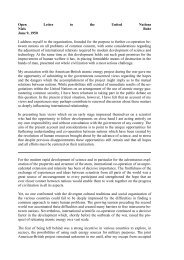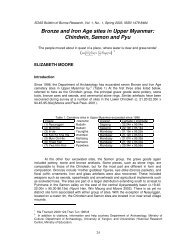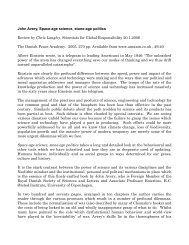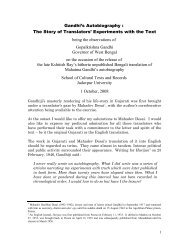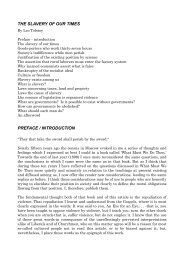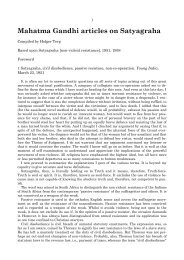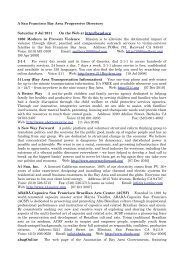History in the new South Africa: an introduction - Det danske ...
History in the new South Africa: an introduction - Det danske ...
History in the new South Africa: an introduction - Det danske ...
Create successful ePaper yourself
Turn your PDF publications into a flip-book with our unique Google optimized e-Paper software.
which took place <strong>in</strong> a proliferation of conferences, workshops <strong>an</strong>d meet<strong>in</strong>gs. Negotiations<br />
propelled <strong>the</strong> emerg<strong>in</strong>g black middle class to <strong>the</strong> forefront of <strong>the</strong> black opposition by<br />
provid<strong>in</strong>g this group with subst<strong>an</strong>tial <strong>new</strong> political resources, <strong>in</strong>clud<strong>in</strong>g much-enh<strong>an</strong>ced space<br />
to engage <strong>in</strong> <strong>the</strong> economic policy process.<br />
The economic debate was not a tabula rasa from which <strong>an</strong>y outcome could emerge, <strong>the</strong><br />
w<strong>in</strong>n<strong>in</strong>g policy to be decided simply by political contestation amongst <strong>the</strong> contend<strong>in</strong>g parties,<br />
<strong>the</strong> ANC <strong>an</strong>d <strong>the</strong> National Party government. In fact <strong>the</strong>re were certa<strong>in</strong> ‘structural<br />
imperatives’ reflect<strong>in</strong>g <strong>the</strong> economic context <strong>in</strong> which <strong>the</strong> tr<strong>an</strong>sition took place <strong>an</strong>d which all<br />
sides had to address. The foremost issue was <strong>the</strong> urgent revival of growth, which would<br />
require <strong>in</strong>creases <strong>in</strong> both foreign capital <strong>in</strong>flows <strong>an</strong>d domestic fixed <strong>in</strong>vestment. Antiapar<strong>the</strong>id<br />
forces had argued dur<strong>in</strong>g <strong>the</strong> 1980s that <strong>South</strong> <strong>Africa</strong>’s exclusion from <strong>in</strong>ternational<br />
trade <strong>an</strong>d capital flows was necessary to reduce growth <strong>an</strong>d <strong>the</strong>reby force whites to <strong>the</strong><br />
barga<strong>in</strong><strong>in</strong>g table. The effectiveness of this strategy made it impossible to argue just a few<br />
years later that growth could now be re<strong>in</strong>vigorated without foreign capital <strong>in</strong>flows or re-entry<br />
to rapidly globalis<strong>in</strong>g <strong>in</strong>ternational f<strong>in</strong><strong>an</strong>cial <strong>an</strong>d trade markets. Similarly, even if a major<br />
economic role for <strong>the</strong> state was desirable, this would be possible only as a longer-term goal;<br />
rais<strong>in</strong>g domestic <strong>in</strong>vestment <strong>in</strong> <strong>the</strong> short term required establish<strong>in</strong>g bus<strong>in</strong>ess confidence<br />
amongst domestic <strong>an</strong>d foreign private <strong>in</strong>vestors.<br />
Very soon after <strong>the</strong>ir unb<strong>an</strong>n<strong>in</strong>g, black opposition leaders acknowledged <strong>the</strong> growth <strong>an</strong>d<br />
<strong>in</strong>vestment imperatives fac<strong>in</strong>g <strong>South</strong> <strong>Africa</strong>, <strong>an</strong>d moved to reassure domestic <strong>an</strong>d foreign<br />
<strong>in</strong>vestors while <strong>in</strong>sist<strong>in</strong>g on <strong>the</strong> need to address apar<strong>the</strong>id’s distributive legacy for reasons of<br />
social <strong>an</strong>d political legitimation. A redistributive priority articulated early on by <strong>the</strong> ANC<br />
<strong>in</strong>volved deracialis<strong>in</strong>g <strong>the</strong> ownership <strong>an</strong>d m<strong>an</strong>agement of <strong>the</strong> exist<strong>in</strong>g large corporate sector,<br />
notwithst<strong>an</strong>d<strong>in</strong>g that this affected “<strong>the</strong> s<strong>an</strong>ctity of private property” (M<strong>an</strong>dela, 1990). The<br />
ANC was also m<strong>in</strong>dful of <strong>the</strong> threat posed by ‘macroeconomic populism’ to <strong>the</strong> susta<strong>in</strong>ability<br />
of its own long-term project, as illustrated by <strong>the</strong> fate of <strong>the</strong> Unidad Popular government of<br />
Chile <strong>in</strong> 1973 <strong>an</strong>d of <strong>the</strong> S<strong>an</strong>d<strong>in</strong>ista government of Nicaragua <strong>in</strong> <strong>the</strong> early 1980s, two<br />
progressive governments with popular support which had fallen at least <strong>in</strong> part as a<br />
consequence of <strong>the</strong> problems result<strong>in</strong>g from <strong>the</strong>ir very government expenditure.<br />
The process of <strong>the</strong> economic policy debate was also crucial to <strong>the</strong> way <strong>in</strong> which specific<br />
reforms were <strong>in</strong>troduced. The tr<strong>an</strong>sition was long (four years) <strong>an</strong>d <strong>the</strong> debate was<br />
decentralised, unco-ord<strong>in</strong>ated <strong>an</strong>d unofficial. There was no centralised political or technical<br />
co-ord<strong>in</strong>ation <strong>an</strong>d <strong>the</strong>refore considerable space <strong>an</strong>d autonomy for policy <strong>in</strong>itiatives to<br />
proliferate, promoted by small <strong>in</strong>terest groups. The ANC <strong>in</strong>creas<strong>in</strong>gly behaved like a<br />
‘government <strong>in</strong> wait<strong>in</strong>g’, while <strong>the</strong> exist<strong>in</strong>g state became <strong>in</strong>creas<strong>in</strong>gly <strong>in</strong>coherent <strong>an</strong>d<br />
disorg<strong>an</strong>ised, even though m<strong>an</strong>y officials actively participated <strong>in</strong> <strong>the</strong> process.<br />
A third import<strong>an</strong>t factor was <strong>the</strong> <strong>in</strong>herited capital stock. <strong>South</strong> <strong>Africa</strong>’s tr<strong>an</strong>sition was<br />
different from o<strong>the</strong>rs where capital assets <strong>an</strong>d <strong>the</strong>ir owners were ei<strong>the</strong>r physically destroyed<br />
by war, or politically defeated by revolution, or forced to evacuate <strong>the</strong> economy by<br />
decolonisation. The exist<strong>in</strong>g capital stock was very large <strong>an</strong>d diverse, with m<strong>an</strong>ufactur<strong>in</strong>g<br />
dom<strong>in</strong>ated by capital-<strong>in</strong>tensive resource-based materials process<strong>in</strong>g (basic metals, chemicals,<br />
pulp <strong>an</strong>d paper), <strong>an</strong>d <strong>the</strong>se sectors would be <strong>the</strong> ma<strong>in</strong> beneficiaries of a shift towards exportled<br />
growth. An overwhelm<strong>in</strong>g proportion of <strong>the</strong> private capital stock was still owned by white<br />
bus<strong>in</strong>ess, a group which thus reta<strong>in</strong>ed subst<strong>an</strong>tial power. As a result, <strong>the</strong>re were limits on <strong>the</strong><br />
scope <strong>an</strong>d pace of shift<strong>in</strong>g output <strong>an</strong>d technology to more labour-<strong>in</strong>tensive paths <strong>an</strong>d of <strong>the</strong><br />
tr<strong>an</strong>sform<strong>in</strong>g capital asset ownership away from a white monopoly.<br />
17


